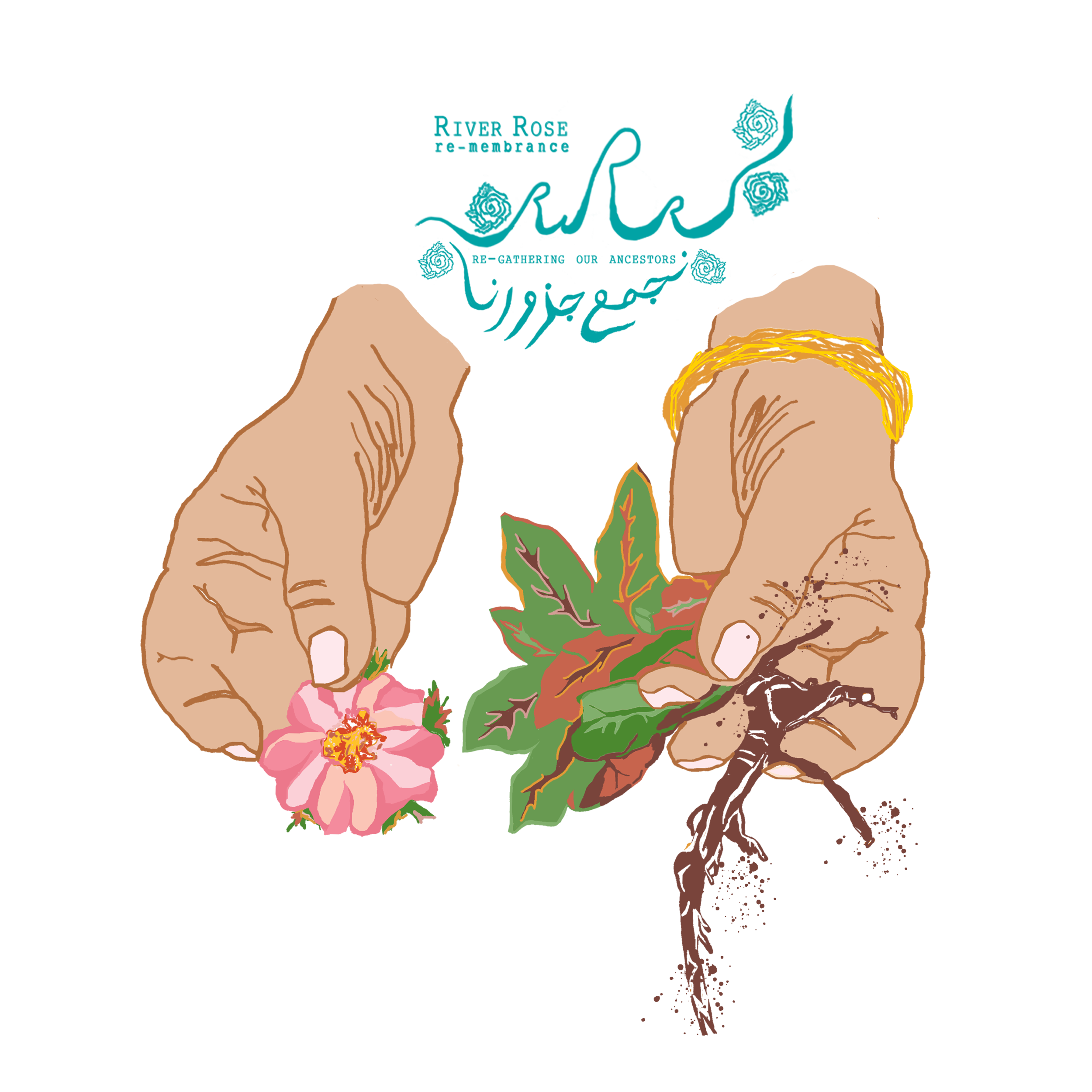This 2 part series is being hosted by the Design Justice Network’s Care Pod. You can learn more about them at https://designjustice.org/djn-care-pod
In this moment, as we witness multiple genocides around the world— in Palestine, Sudan, Congo, Kashmir, and elsewhere— it can feel easy to surrender to defeat and despair, and to sever ourselves from taking the risks that resistance truly demands. What if we turn to land, and our relationships with plantcestral beings, as a source of strategy, a source of support through feelings of fear and inertia and defeat, an anchor for deepening into movement-building, a compass towards new possibilities? How have generations of violence and colonization ruptured our relationships with land, and how do these ruptures impact our sense of collaboration and capacity for community-building?
Join us for our July Care Pod series, where Guest Practitioner Layla K. Feghali will guide us through an exploration of land, lineage, plantcestors, and resistance to colonialism, in relation to design justice.
Participation in both gatherings is not mandatory, though we encourage you to join both if possible, as they build on each other. These experiences are virtual, free, and open to people practicing (or curious about) Design Justice and Design Justice Principles. DJN Membership and previous attendance are not required. Design Justice Principles will be woven into each gathering and we will invite discussions that connect us back to creative, collaborative ways of working and being.
CARE CIRCLE
Tuesday July 9, 2024 / 11AM - 1:30PM EDT
How to prepare for this gathering:
Please bring some form of rose and/or olive, which will support the experiential learning process shared during the session. This can be any form which is accessible to you, such as: rosewater, olive oil, a branch or flower from either of these plants (dry or fresh), a flower essence, tincture, infused oil, tea, food, etc. Tangible forms of the plant may be helpful, but if this is not accessible for any reason, a video, image, drawing or other representation of the plant can also be used.
In this Care Circle, we will gently enter into an exploration of our relationships with plantcestors, ancestral remembrance, land, and the language of our own bodies. What is “Plantcestral Re-membrance”? What is the memory that our bodies, lineages, and the land hold? How does the land communicate with and through us, despite the ruptures and losses our lineages and landscapes have endured?
Through sharing some foundational concepts and tools, guided meditation, reflection spaces, and collectively working with rose and olive, we will begin attuning to the ways that our bodies and inner landscapes illuminate and deepen our capacity to build relationships with plants. And, in turn, we will learn about the ways that the earth and our plant lineages are communicating with us, and through us, via our inner landscapes. We welcome you to show up as your full self, with all your emotions and lived experiences, and to participate in whatever ways feel accessible for you. There will be multiple options for engaging with plant beings; more details will be sent in advance to registrants.
PRACTICE SPACE
Saturday, July 27, 2024 / 11AM - 1:30PM EDT
How to prepare for this gathering:
Please bring some form of a plant from your ancestral lands or cultures. (Spices from your cultural foods, or garden plants you associate with your grandparents or elders are a good place for inspiration). This can be any form which is accessible to you, such as: a hydrosol, a fresh or dried branch or flower of the plant, a flower essence, tincture, infused oil, tea, food, etc. Tangible forms of the plant may be helpful, but if this is not accessible for any reason, a video, image, drawing or other representation of the plant can also be used.
More detailed prompts for choosing a plant will be shared in advance with registrants.
In this Practice Space, we will continue our Care Circle explorations of land, sovereignty, plant lineages, and movement-building. How does plantcestral connection relate to resistance? What does land teach us about colonialism and our defiance in the face of it? How might our inner ecologies trap us in states of despair and stagnation that keep us from being part of collective liberation movements? And how might the land and our lineages hold and support us through growth, steadfastness, and action?
Through collective reflection, plant meditations, and writing practices, we will deepen into relationship with an ancestral plant of your own choosing. We welcome you to show up as your full self, with all your emotions and lived experiences, and to participate in whatever ways feel comfortable for you.
Practitioner Bio
Layla K. Feghali is an ethnobotanist, cultural worker, and author who lives between her ancestral village in Lebanon and her diasporic home in California, where she was born and raised. Her dedication is the stewardship of eco-cultural re-membrance and decolonization movements, and the many layers of relational restoration, systemic reckoning, and healing that entails. Feghali offers a line of plantcestral medicine, education, and other culturally-rooted offerings and mutual aid efforts, with an emphasis on land-based ancestral practices from the Crossroads (southwest Asia + northern Africa) and its diasporas. Her recent book, The Land in Our Bones, documents cultural herbal and healing knowledge from Syria to the Sinai, while interrogating colonialism and its lingering wounds on the culture of our displaced world.
Access Supports
ASL interpretation
Auto-captioning via Zoom Recording, with options for asynchronous participation
Visual descriptions by speakers
Emotional Support available during the gathering
Tech support
Scheduled breaks throughout the two and a half hours
Show up as you are: feel free to take additional breaks, have camera on or off, move around your space, etc.
General Gathering Flow
Opening & Landing
Check-In Conversations
Topic Explorations with Guest Practitioner
Break
Group Discussions
Announcements & Closing
